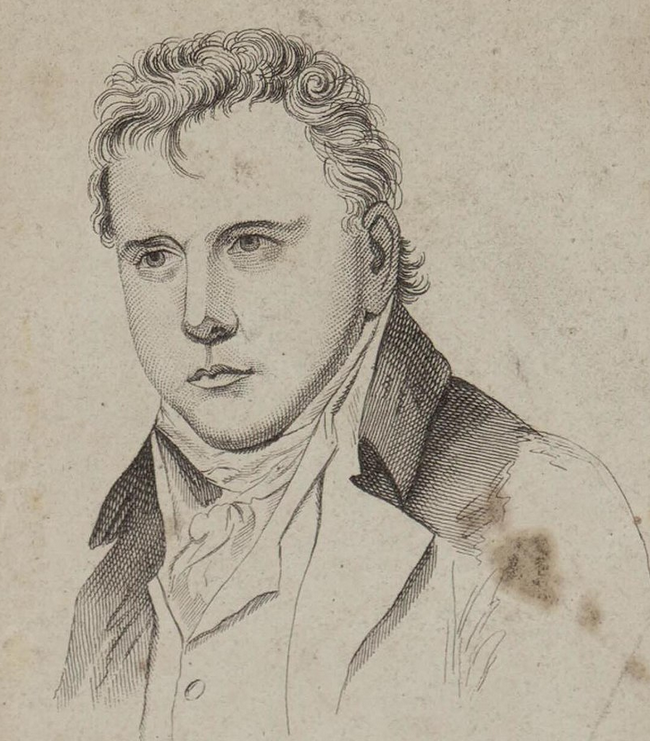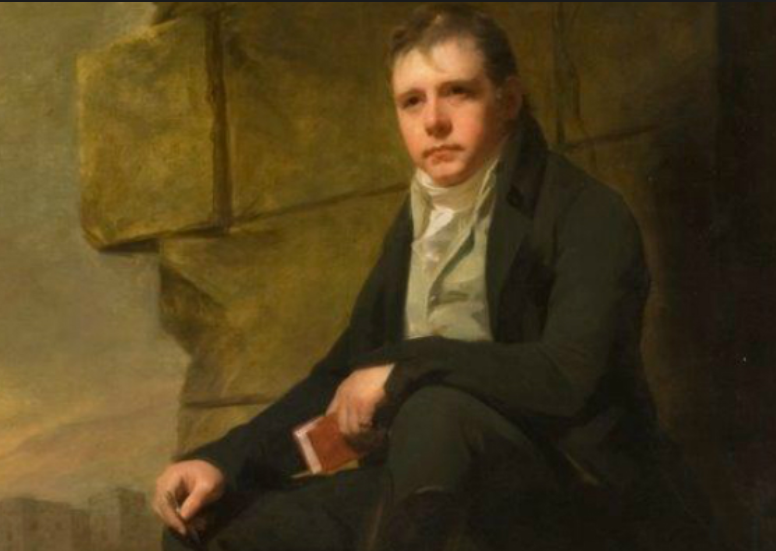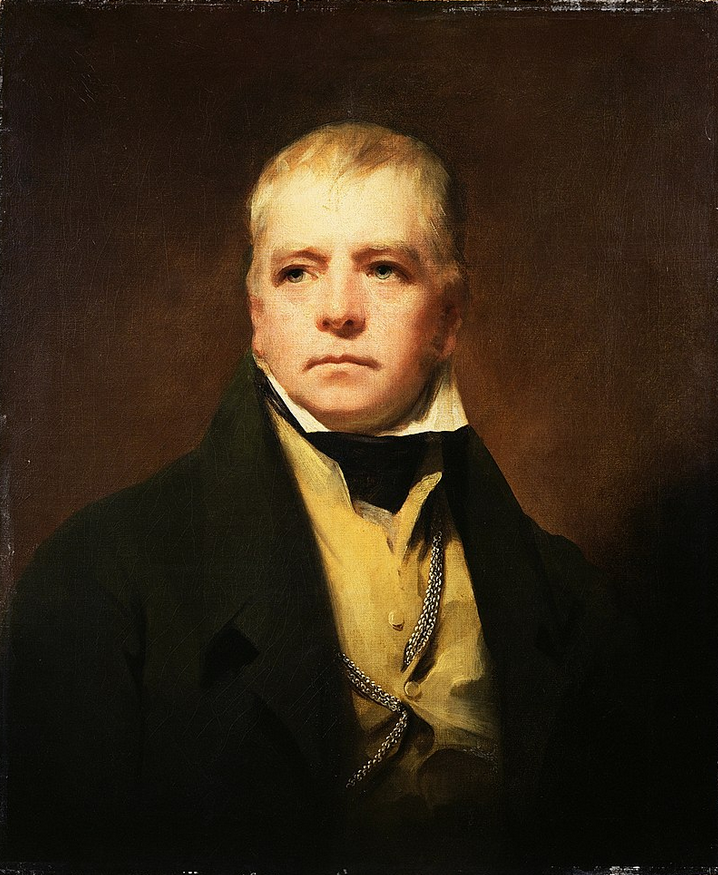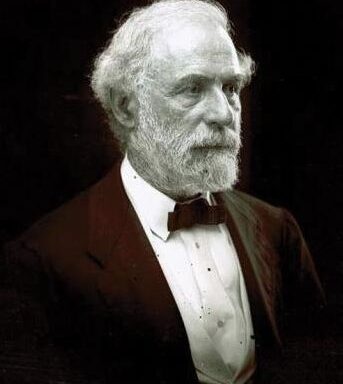Editor’s note: The following is extracted from Gray Days and Gold in England and Scotland, by William Winter (published 1896). All spelling in the original.
More than a century has passed since Walter Scott was born—a poet destined to exercise a profound, far-reaching, permanent influence upon the feelings of the human race, and thus to act a conspicuous part in its moral and spiritual development and guidance. To the greatness of his mind, the nobility of his spirit, and the beauty of his life there is abundant testimony in his voluminous and diversified writings, and in his ample and honest biography. Everybody who reads has read something from the pen of Scott, or something commemorative of him, and in every mind to which his name is known it is known as the synonym of great faculties and wonderful achievement. There must have been enormous vitality of spirit, prodigious power of intellect, irresistible charm of personality, and lovable purity of moral nature in the man whom thousands that never saw him living,—men and women of a later age and different countries,—know and remember and love as Sir Walter Scott. Others have written greatly. Milton, Dryden, Addison, Pope, Cowper, Johnson, Byron, Shelley, Wordsworth, Coleridge, Landor,—these are only a few of the imperial names that cannot die. But these names live in the world’s respect. The name of Scott lives also in its affection. What other name of the past in English literature,—unless it be that of Shakespeare,—arouses such a deep and sweet feeling of affectionate interest, gentle pleasure, gratitude, and reverential love?
The causes of Sir Walter Scott’s ascendency are to be found in the goodness of his heart; the integrity of his conduct; the romantic and picturesque accessories and atmosphere of his life; the fertile brilliancy of his literary execution; the charm that he exercises, both as man and artist, over the imagination; the serene, tranquillising spirit of his works; and, above all, the buoyancy, the happy freedom, of his genius. He was not simply an intellectual power; he was also a human and gentle comforter. He wielded an immense mental force, but he always wielded it for good, and always with tenderness. It is impossible to conceive of his ever having done a wrong act, or of any contact with his influence that would not inspire the wish to be virtuous and noble. The scope of his sympathy was as broad as the weakness and the need are of the human race. He understood the hardship, the dilemma, in the moral condition of mankind: he wished people to be patient and cheerful, and he tried to make them so. His writings are full of sweetness and cheer, and they contain nothing that is morbid,—nothing that tends toward surrender and misery. He did not sequester himself in mental pride, but simply and sturdily, through years of conscientious toil, he employed the faculties of a strong, tender, gracious genius for the good of his fellow-creatures. The world loves him because he is worthy to be loved, and because he has lightened the burden of its care and augmented the sum of its happiness.
Certain differences and confusions of opinion have arisen from the consideration of his well-known views as to the literary art, together with his equally well-known ambition to take and to maintain the rank and estate of a country squire. As an artist he had ideals that he was never able to fulfil. As a man, and one who was influenced by imagination, taste, patriotism, family pride, and a profound belief in established monarchical institutions, it was natural that he should wish to found a grand and beautiful home for himself and his posterity. A poet is not the less a poet because he thinks modestly of his writings and practically knows and admits that there is something else in the world beside literature; or because he happens to want his dinner and a roof to cover him. In trying to comprehend a great man, a good method is to look at his life as a whole, and not to deduce petty inferences from the distorted interpretation of petty details. Sir Walter Scott’s conduct of life, like the character out of which it sprang, was simple and natural. In all that he did you may perceive the influence of imagination acting upon the finest reason; the involuntary consciousness of reserve power; habitual deference to the voice of duty; an aspiring and picturesque plan of artistic achievement and personal distinction; and deep knowledge of the world. If ever there was a man who lived to be and not to seem, that man was Sir Walter Scott. He made no pretensions. He claimed nothing, but he simply and earnestly earned all. His means were the oldest and the best; self-respect, hard work, and fidelity to duty. The development of his nature was slow, but it was thorough and it was salutary. He was not hampered by precocity and he was not spoiled by conceit. He acted according to himself, honouring his individuality and obeying the inward monitor of his genius. But, combined with the delicate instinct of a gentleman, he had the wise insight, foresight, and patience of a philosopher; and therefore he respected the individuality of others, the established facts of life, and the settled conventions of society. His mind was neither embittered by revolt nor sickened by delusion. Having had the good fortune to be born in a country in which a right plan of government prevails,—the idea of the family, the idea of the strong central power at the head, with all other powers subordinated to it,—he felt no impulse toward revolution, no desire to regulate all things anew; and he did not suffer perturbation from the feverish sense of being surrounded with uncertainty and endangered by exposure to popular caprice. During the period of immaturity, and notwithstanding physical weakness and pain, his spirit was kept equable and cheerful, not less by the calm environment of a permanent civilisation than by the clearness of his perceptions and the sweetness of his temperament. In childhood and youth he endeared himself to all who came near him, winning affection by inherent goodness and charm. In riper years that sweetness was reinforced by great sagacity, which took broad views of individual and social life; so that both by knowledge and by impulse he was a serene and happy man.

The quality that first impresses the student of the character and the writings of Sir Walter Scott is truthfulness. He was genuine. Although a poet, he suffered no torment from vague aspirations. Although once, and miserably, a disappointed lover, he permitted no morbid repining. Although the most successful author of his time, he displayed no egotism. To the end of his days he was frank and simple,—not indeed sacrificing the reticence of a dignified, self-reliant nature, but suffering no blight from success, and wearing illustrious honours with spontaneous, unconscious grace. This truthfulness, the consequence and the sign of integrity and of great breadth of intellectual vision, moulded Sir Walter Scott’s ambition and stamped the practical results of his career. A striking illustration of this is seen in his first adventure in literature. The poems originally sprang from the spontaneous action of the poetic impulse and faculty; but they were put forth modestly, in order that the author might guide himself according to the response of the public mind. He knew that he might fail as an author, but for failure of that sort, although he was intensely ambitious, he had no dread. There would always remain to him the career of private duty and the life of a gentleman. This view of him gives the key to his character and explains his conduct. Neither amid the experimental vicissitudes of his youth, nor amid the labours, achievements, and splendid honours of his manhood, did he ever place the imagination above the conscience, or brilliant writing above virtuous living, or art and fame above morality and religion. “I have been, perhaps, the most voluminous author of the day,” he said, toward the close of his life; “and it is a comfort to me to think that I have tried to unsettle no man’s faith, to corrupt no man’s principles, and that I have written nothing which, on my deathbed, I should wish blotted.” When at last he lay upon that deathbed the same thought animated and sustained him. “My dear,” he said, to Lockhart, “be a good man, be virtuous, be religious—be a good man. Nothing else will give you any comfort when you come to lie here.” The mind which thus habitually dwelt upon goodness as the proper object of human ambition and the chief merit of human life was not likely to vaunt itself on its labours or to indulge any save a modest and chastened pride in its achievements.
And this view of him explains the affectionate reverence with which the memory of Sir Walter Scott is cherished. He was pre-eminently a type of the greatness that is associated with virtue. But his virtue was not decorum and it was not goodyism. He does not, with Addison, represent elegant austerity; and he does not, with Montgomery, represent amiable tameness. His goodness was not insipid. It does not humiliate; it gladdens. It is ardent with heart and passion. It is brilliant with imagination. It is fragrant with taste and grace. It is alert, active, and triumphant with splendid mental achievements and practical good deeds. And it is the goodness of a great poet,—the poet of natural beauty, of romantic legend, of adventure, of chivalry, of life in its heyday of action and its golden glow of pageantry and pleasure. It found expression, and it wields invincible and immortal power, through an art whereof the charm is the magic of sunrise and sunset, the sombre, holy silence of mountains, the pensive solitude of dusky woods, the pathos of ancient, ivy-mantled ruins, and ocean’s solemn, everlasting chant. Great powers have arisen in English literature; but no romance has hushed the voice of the author of Waverley, and no harp has drowned the music of the Minstrel of the North.
The publication of a new book by Sir Walter Scott is a literary event of great importance. The time has been when the announcement of such a novelty would have roused the reading public as with the sound of a trumpet. That sensation, familiar in the early part of the present century, is possible no more. Yet there are thousands of persons all over the world through whose hearts the thought of it sends a thrill of joy. The illustrious author of Marmion and of Waverley passed away in 1832: and now (1890), at the distance of fifty-eight years, his private Journal is made a public possession. It is the bestowal of a great privilege and benefit. It is like hearing the voice of a deeply-loved and long-lamented friend, suddenly speaking from beyond the grave.
In literary history the position of Scott is unique. A few other authors, indeed, might be named toward whom the general feeling was once exceedingly cordial, but in no other case has the feeling entirely lasted. In the case of Scott it endures in undiminished fervour. There are, of course, persons to whom his works are not interesting and to whom his personality is not significant. Those persons are the votaries of the photograph, who wish to see upon the printed page the same sights that greet their vision in the streets and in the houses to which they are accustomed. But those prosy persons constitute only a single class of the public. People in general are impressible through the romantic instinct that is a part of human nature. To that instinct Scott’s writings were addressed, and also to the heart that commonly goes with it. The spirit that responds to his genius is universal and perennial. Caprices of taste will reveal themselves and will vanish; fashions will rise and will fall; but these mutations touch nothing that is elemental and they will no more displace Scott than they will displace Shakespeare.
The Journal of Sir Walter Scott, valuable for its copious variety of thought, humour, anecdote, and chronicle, is precious, most of all, for the confirmatory light that it casts upon the character of its writer. It has long been known that Scott’s nature was exceptionally noble, that his patience was beautiful, that his endurance was heroic. These pages disclose to his votaries that he surpassed even the highest ideal of him that their affectionate partiality has formed. The period that it covers was that of his adversity and decline. He began it on November 20, 1825, in his town house, No. 39 Castle street, Edinburgh, and he continued it, with almost daily entries,—except for various sadly significant breaks, after July 1830,—until April 16, 1832. Five months later, on September 21, he was dead. He opened it with the expression of a regret that he had not kept a regular journal during the whole of his life. He had just seen some chapters of Byron’s vigorous, breezy, off-hand memoranda, and the perusal of those inspiriting pages had revived in his mind the long-cherished, often-deferred plan of keeping a diary. “I have myself lost recollection,” he says, “of much that was interesting, and I have deprived my family and the public of some curious information by not carrying this resolution into effect.” Having once begun the work he steadily persevered in it, and evidently he found a comfort in its companionship. He wrote directly, and therefore fluently, setting down exactly what was in his mind, from day to day; but, as he had a well-stored and well-ordered mind, he wrote with reason and taste, seldom about petty matters, and never in the strain of insipid babble that egotistical scribblers mistake for the spontaneous flow of nature. The facts that he recorded were mostly material facts, and the reflections that he added, whether serious or humorous, were important. Sometimes a bit of history would glide into the current of the chronicle; sometimes a fragment of a ballad; sometimes an analytic sketch of character, subtle, terse, clear, and obviously true; sometimes a memory of the past; sometimes a portraiture of incidents in the present; sometimes a glimpse of political life, a word about painting, a reference to music or the stage, an anecdote, a tale of travel, a trait of social manners, a precept upon[275] conduct, or a thought upon religion and the destiny of mankind. There was no pretence of order and there was no consciousness of an audience; yet the Journal unconsciously assumed a symmetrical form; and largely because of the spontaneous operation of its author’s fine literary instinct it became a composition worthy of the best readers. It is one of the saddest and one of the strongest books ever written.
The original manuscript of this remarkable work is contained in two volumes, bound in vellum, each volume being furnished with a steel clasp that can be fastened. The covers are slightly tarnished by time. The paper is yellow with age. The handwriting is fine, cramped, and often obscure. “This hand of mine,” writes Scott (vol. i. page 386), “gets to be like a kitten’s scratch, and will require much deciphering, or, what may be as well for the writer, cannot be deciphered at all. I am sure I cannot read it myself.” The first volume is full of writing; the second about half full. Toward the end the record is almost illegible. Scott was then at Rome, on that melancholy, mistaken journey whereby it had been hoped, but hoped in vain, that he would recover his health. The last entry that he made is this unfinished sentence: “We slept reasonably, but on the next morning——.” It is not known that he ever wrote a word after that time. Lockhart, who had access to his papers, made some use of the Journal, in his Life of Scott, which is one of the best biographies in our language; but the greater part of it was withheld from publication till a more auspicious time for its perfect candour of speech. To hold those volumes and to look upon their pages,—so eloquent of the great author’s industry, so significant of his character, so expressive of his inmost soul,—was almost to touch the hand of the Minstrel himself, to see his smile, and to hear his voice. Now that they have fulfilled their purpose, and imparted their inestimable treasure to the world, they are restored to the ebony cabinet at Abbotsford, there to be treasured among the most precious relics of the past. “It is the saddest house in Scotland,” their editor, David Douglas, said to me, when we were walking together upon the Braid Hills, “for to my fancy every stone in it is cemented with tears.” Sad or glad, it is a shrine to which reverent pilgrims find their way from every quarter of the earth, and it will be honoured and cherished forever.
(Continue to Part 2)









